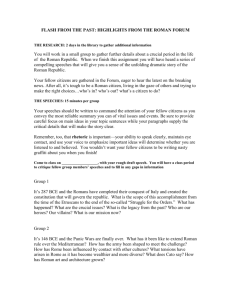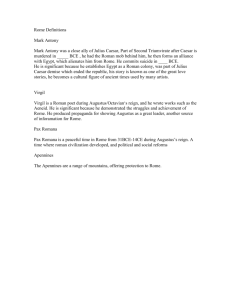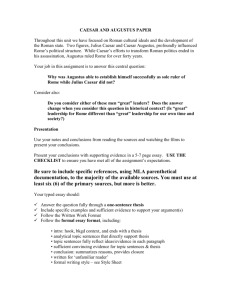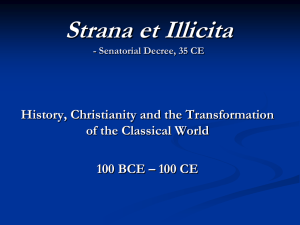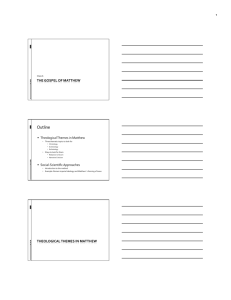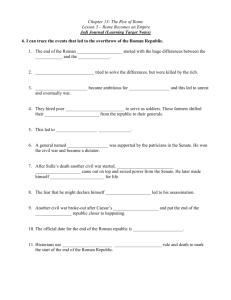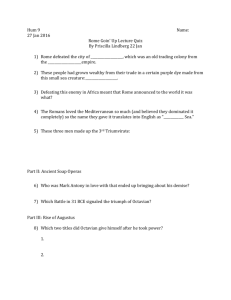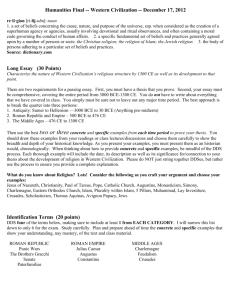Outline: Roman Political Theology
advertisement
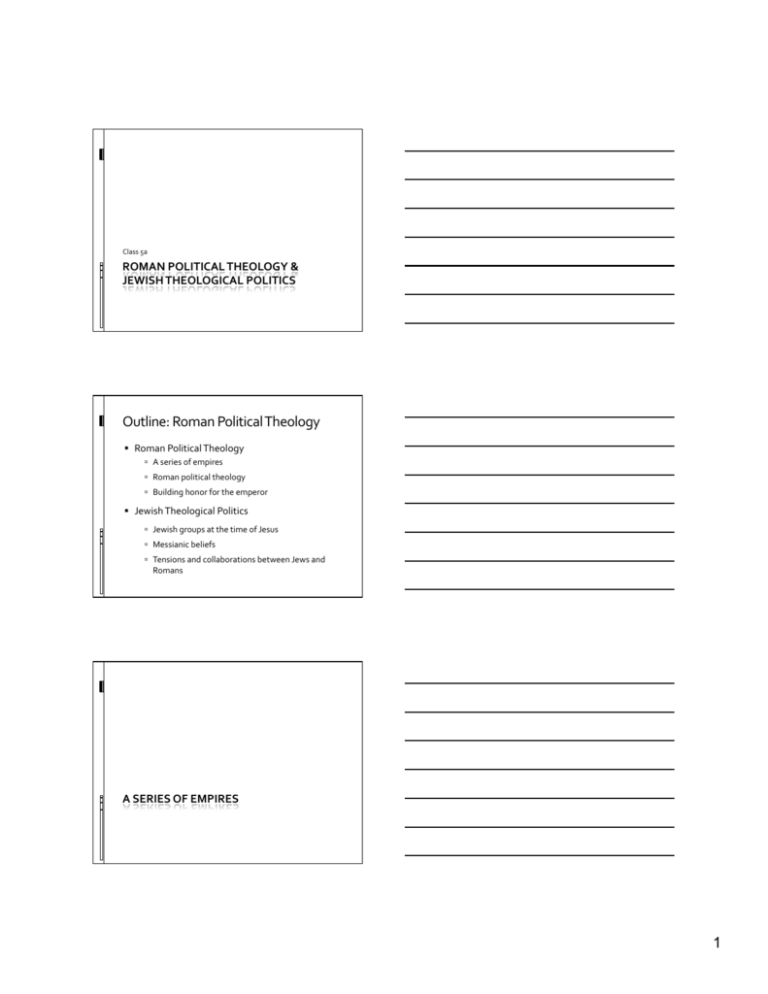
Class 5a ROMAN POLITICAL THEOLOGY & JEWISH THEOLOGICAL POLITICS Outline: Roman Political Theology § Roman Political Theology ú A series of empires ú Roman political theology ú Building honor for the emperor § Jewish Theological Politics ú Jewish groups at the time of Jesus ú Messianic beliefs ú Tensions and collaborations between Jews and Romans A SERIES OF EMPIRES 1 Assyrian Empire (709-649 BCE) Neo-Babylonian Empire (609-539 BCE) Persian Empire (550-330 BCE) 2 Hellenistic Empires (332 BCE) Hellenistic Empires (332 BCE) 3 ROME: FROM REPUBLIC TO EMPIRE POMPEY 63 BCE JULIUS CAESAR 49-44 BCE OCTAVIAN, aka CAESAR AUGUSTUS 27 BCE–14 CE ROMAN POLITICAL THEOLOGY Roman Political Theology 1. Augustus presented himself as an agent of restoration, not innovation • stability • prosperity • moral renewal 2. His poets and propaganda praised him as a kind of heaven-­‐sent agent • Virgil’s Aeneid aligns Augustus with the founder of Rome • Augustus aligns himself with gods of peace, victory, abundance on coins and statues 3. In fact this propaganda was meant to offset the radical innovation that Augustus represented: breaking from republican traditions and establishing himself as the sole ruler 4 Ara Pacis Augustae, Rome Ara Pacis Augustae, Rome Octavian denarius Winged victory on ship’s prow holding wreath/crown of victory Emperor on chariot, holding olive branch Inscription: Imp[erator] Caesar 5 Octavian denarius, 19-­‐18 BCE Caesar Augustus “Caesar’s Comet” 7-­‐day comet the appeared during the Ludi Victoriae Caesaris a few months after Julius Caesar was assassinated, taken as a symbol of his deification by Octavian Inscription: Divvs Ivliv The Augustan Building Program in Pompeii Octavian denarius, 32-­‐29 BCE Bust of Octavian (Augustus Caesar) Pax, holding olive branch and cornucopia Inscription: Caesar Divi F 6 BUILDING HONOR FOR THE EMPEROR 7 8 9 BUILDING HONOR FOR THE EMPEROR Gaulanitis Galilee 63 BCE Pompey takes region for Rome 40 BCE Roman senate appoints Herod “King of the Jews” Samaria Perea Judea Gaza Idumea 37 BCE Herod secures control 37 -­‐ 4 BCE Launches a huge building and infra-­‐ structure program, honoring the Emperor wherever he can 10 Galilee 4 BCE Herod dies, and 3 sons split his kingdom; Philip builds Caesarea Philippi Samaria 6 CE Herod Archelaus can’t control the south, so the Romans take over direct administration Gaulanitis Perea Judea Gaza Idumea Herod Antipas builds the city of Tiberias to honor the new emperor in 20 CE Galilee 4 BCE Herod dies, and 3 sons split his kingdom; Philip builds Caesarea Philippi Samaria 6 CE Herod Archelaus can’t control the south, so the Romans take over direct administration Gaulanitis Perea Judea Gaza Idumea 40 CE Rome grants Herod Agrippa I the entire region; he promotes Roman interests aggressively, increasing tension 66-­‐74 CE First Jewish Revolt; Temple destroyed Gospels begin to be written JEWISH THEOLOGICAL POLITICS 11 Jewish Groups at the Time of Jesus Sources § Josephus, War and Antiquities § Dead Sea Scrolls ú Essene documents ú veiled (negative) references to other groups § Philo of Alexandria § Scattered references in other authors Jewish Groups at the Time of Jesus Common Beliefs § Monotheistic theology § Notion of election – “the chosen people” § Shared revelation in Torah § Sacrificial cult The Jerusalem Temple 12 The Jerusalem Temple What Remains Today The Jerusalem Temple Carbon shadows of arcade burned during Jewish revolt Jewish Groups at the Time of Jesus Differences Group Socio-­‐economic class Religious views Entire nation Sadducees Pharisees Essenes 13 Additional Groups § Samaritans § Zealots § Scribes MESSIAHS & MESSIANIC BELIEFS Messiah Defined § Moshiah in Hebrew means “oily one,” “anointed one” § Greek speaking Jews translated the term “christos” (Christ) 14 Messiahs in Jewish History § Belief in a messiah is NOT a central belief for all Jewish groups § For groups that DO believe in a messiah, the beliefs vary a lot § And in the last 2000 years, there have been several messiahs Messiahs in Jewish History 27–30 Jesus of Nazareth Seven Models of the Messiah § king § priest § prophet Other Jewish groups expected Saviors like these § heavenly agent § suffering servant § new Adam § Logos (Word) of God John J. Collins, The Scepter and the Star: The Messiahs of the Dead Sea Scrolls and Other Ancient Literature, Anchor Bible Reference Library (New York: Doubleday, 1995). 15 TENSIONS AND COLLABORATIONS BETWEEN JEWS & ROMANS Tensions & Collaborations No single Judaism, no single Jewish view of Rome § Some shared sensibilities ú Roman gods not welcome in Jerusalem ú Jewish cult given some autonomy § Collaborations ú Upper socio-­‐economic/religious groups shared Rome’s interests ú Roman law, culture, social practices were integrated ú Rome’s political theology was mimicked even by opponents § Tensions ú Tribute, billeting, molestation, conscription ú Client kings vs. royal tradition ú Economic impacts ú Outright rebellion 16
